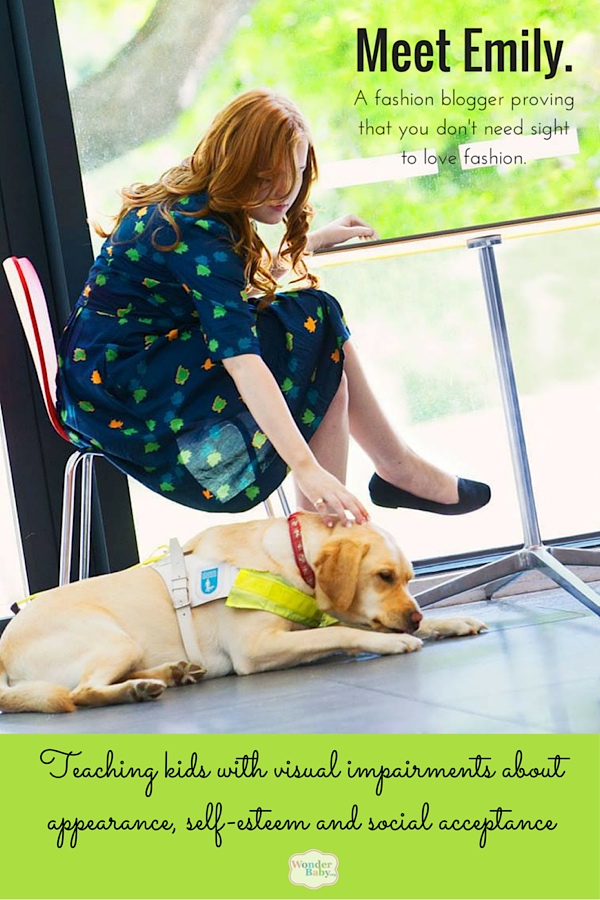Looking Good and Feeling Good When You’re Visually Impaired
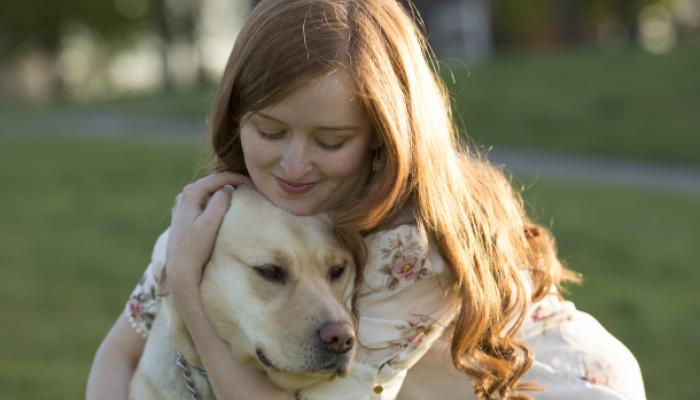
I recently had the pleasure of corresponding with Emily Davison, a fashion blogger, HuffPost columnist, graduate student and disability advocate. Oh yeah, and she’s visually impaired. I’ve followed Emily on social media for some time and love everything she shares with her followers. (I’m a little bit of a fashion junkie myself!) But it wasn’t until I emailed her about my own daughter, Madilyn, who has been blind since birth, that I began to understand what the connection between visual impairments and personal appearances should be like for anyone, not just someone who is blind!
Madilyn just turned 11 years old and *gulp* is now a pre-teen. Where did all the time go?! She was born with craniofacial anomalies that cause her face to be non-symmetrical with a little button nose and an eye condition known as anophthalmia which means she doesn’t have eyeballs. We still haven’t been able to get prosthetic eyes that will stay in either so she always looks like her eyes are just closed to onlookers. So now that she is getting older and more independent with self-dressing and taking care of herself, I find myself tiptoeing around the words I use to encourage and motivate her to keep it up while explaining the rest of the world.
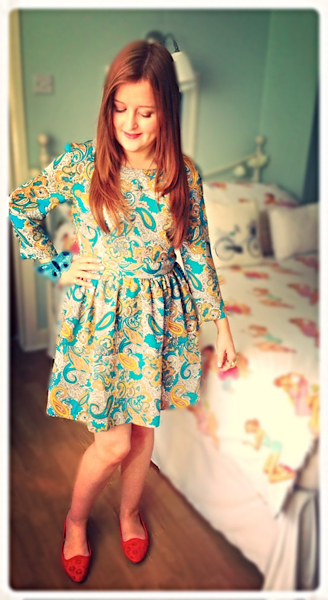 On the one hand, I want her to eventually understand the social acceptance of the world, but on the other hand, I’m always practicing the mantra of “who cares what others think as long as you’re happy with yourself.” Still there’s a certain threshold that must be met in order to get a job, make new friends, etc. So… I feel like a hypocrite. I’m sure it’s a struggle many parents go through, but it’s really hard raising a child with all the expectations the media puts out there 24/7. I’d like to keep her oblivious to all of it forever, but obviously that’s just not fair. I believe that we’ve raised a truly confident girl who isn’t self conscious and I don’t want the next years to change that!
On the one hand, I want her to eventually understand the social acceptance of the world, but on the other hand, I’m always practicing the mantra of “who cares what others think as long as you’re happy with yourself.” Still there’s a certain threshold that must be met in order to get a job, make new friends, etc. So… I feel like a hypocrite. I’m sure it’s a struggle many parents go through, but it’s really hard raising a child with all the expectations the media puts out there 24/7. I’d like to keep her oblivious to all of it forever, but obviously that’s just not fair. I believe that we’ve raised a truly confident girl who isn’t self conscious and I don’t want the next years to change that!
After explaining my guilt and confusion to Emily, she responded with a truly thoughtful message that made me realize that everything’s going to be okay. Here’s what she wrote:
Your daughter sounds like a very lovely young lady and I’m sure she’ll bloom into a very confident and strong person even more so as she goes through life. I think personal appearance is important just as much as what we do with our inner selves. Both can be intwined and confidence is something we all need in life; and, some of us need a little more help to access that confidence in the form of makeup and clothes. My mother was exactly the same, although she always told me to work hard at school, be kind and have fun. She was also a makeup artist for many years and therefore looking good was very important. I wasn’t allowed to leave the house with bad eyebrows or harsh makeup when I was a teen. But, she’s taught me a lot and all the makeup, hair styling and fashion skills I have now are on account of her teaching me. I think its a normal thing as a parent to someone with a visual impairment to want to teach them the importance of looking good and taking care of appearance. As you say its a form of social acceptance, which is a key part of growing up. Its about helping young people find their identity and experimenting with fashion and makeup can be part of that transformation. -Emily
It’s apparent Emily is a confident young woman and wants to show the world that her disability will not overshadow the bright and beautiful life she wants to lead. With all of her hard work and accomplishments, I’d say she’s setting a good example for our kids! After our initial conversation, I asked Emily a few more questions. Read on to learn more about all the places her love for fashion has taken her. She shares tips for parents and older kids to support independence and self esteem while having fun with it all, too!
Q&A with Emily Davison, Fashioneyesta
Q. When did you become so interested in fashion and beauty?
Emily: I’ve always been interested in fashion and beauty from a very early age, my mother worked for a cosmetics company for 9 years and my aunt used to dabble in theatre. Growing up with a disability I always felt rather isolated, I felt as if my disability was all people could see. I wanted people to see me and not my disability. So when I got into my teen years I started to use fashion and beauty as a way to express myself. I wanted to stand out from the crowd, but for the reasons I deemed right. Fashion and beauty was my way of saying that my disability didn’t define me and that’s what I aim to translate into my blog.
Q. I saw your blog post from when you went to London Fashion Weekend! Wow! That must have been so much fun! What was it like?
Emily: London Fashion Weekend is always a lot of fun! I’ve been now for the fourth year in a row and I’m always excited to go there to report on the latest trends and looks. I really enjoy going because I always get treated with so much care and the staff always ensure that I am able to access the show with my remaining vision. They are always so attentive and offer me assistance and treat my little guide dog like a princess! The other thing I love about London Fashion Weekend is that I’m in a throng of other like minded individuals who all love fashion, beauty and blogging just as much as I do. When I rock up with my glad rags, DSLR and my guide dog I feel empowered; it’s as if I’m saying ‘disability doesn’t stop you from loving fashion’ and in my own small way I’m representing people with disabilities at the fashion scene.
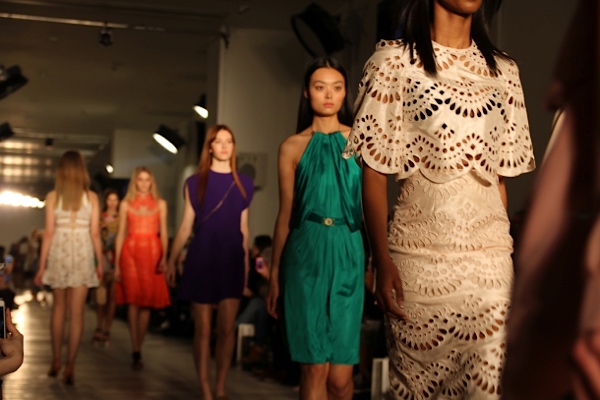
Q. You have tons of beautiful and creative pictures on your blog and Instagram. What do you enjoy most about sharing these images with others on social media?
Emily: I really enjoy photography and taking pictures for my blog, I like the fact that my images are all saved in an online gallery. I can go back and browse through my work and see how far I’ve come from the early days when I used a phone and editing apps to take pictures.
But I also love taking pictures for my blog, because it’s such an everyday thing for a fashion and beauty blogger to do. So, though I may be talking one day about my disability, the next day I’ll be writing a review or sharing an outfit of the day just like any other blogger. It makes me feel like part of the blogging community.
Q. Do you use any assistive technology on your phone or computer like VoiceOver or Zoom? Are there any specific apps that you absolutely love?
Emily: Yes, I do indeed. I use many different apps to help me with my work. I use Zoom and Speak Selection on my iPhone when I’m browsing fashion sites for inspiration on blogs and posts. I also use apps like Claro Read to read text back to me from other blogs or fashion magazines. When I’m organizing outfits I use a virtual closet app to help me file my clothes with a picture, description and information on where it can be found and what goes with it. There are other apps I love to use of course like Twitter, Instagram, WordPress App and so on to help me keep on track of my blogs and social media. They are also accessible and are being made more so each and every day.
I do also have an electronic magnifier which I use to help me when reading magazines and shopping for clothes if I can’t see the price or sizing.
Q. With all the clothes, accessories and products you must have, how do you keep it all organized? Any helpful tips for teenagers and young adults who are visually impaired?
Emily: With great difficulty! I am a self acclaimed shopaholic and I’ve had to upgrade my storage with a full blown Ikea Alex dressing table. But, the way I do it is to have separate drawers and containers for each thing: one drawer for palettes, another for lipsticks, another for eyeliners and so on. I use drawer dividers which can be bought online or from Ikea, Tiger and so on to separate my makeup into different sections.
For clothing, I tend to rotate it round to different times of the year. I have a huge clothing rail in my loft and that’s where I leave a lot of my clothes for each season and get them out as the climate changes. With my wardrobe, I tend to organize my clothes in order of the color spectrum from red to violet and white and black. I also organize the clothes in order of type. This means that I have a system to know roughly where each garment will be. I also have a separate place for jeans and skirts and another for scarves. I also keep storage boxes for my hats, clutch bags and other outerwear items and accessories.

Q. How do you plan your outfits? I’m sure the weather dictates a lot, but when you get up in the morning how do you decide what you’ll wear and choose accessories? (i.e. color, texture, style?)
Emily: As I mentioned above I do use a virtual wardrobe app which helps me plan my outfits in advance, I can browse through and see what I have to potentially make an outfit. But I also do have to consider things like weather, where the event is and traveling that might be involved. When I’m planning an outfit I choose one feature piece like a certain top or accessory and plan an outfit around that. But, if I’m feeling really uninspired I will wear something like a pair of jeans and a blouse with a really beautifully embellished shrug that I picked up on my travels from London. But, when I plan outfits it’s always with one thing in mind: I’m changing perceptions on disability with my style, so it has to be stylish!
Q. What has been the hardest part of being visually impaired and interested in fashion? How did you deal with it?
Emily: I’d say the hardest thing for me is people’s misconceptions around sight loss. It’s very frustrating to be out and about and to hear someone utter the infamous words, “You don’t look blind!” In the past I found it difficult to deal with people’s comments and scrutiny over the way I decided to dress. It was difficult facing the disbelief in their voice and the way sometimes it was as if they believed that I was lying about being disabled, just because I was wearing a Lulu Guinness bag and a pair of T Bar red shoes. But, as I’ve got older I’ve grown a thicker skin and I simply laugh it off and think to myself, “I’m going to use this as content for my blog or creative writing.”
Q. What is the most important advice you would give to a girl (or guy!) interested in fashion or other art, but feels like her vision impairment is holding her back?
Emily: Life’s precious, I’ve really come to appreciate this lately after losing my close friend to cancer. You cannot let anything hold you back in life, that’s no way to live. If you have a passion or a hobby you want to pursue, but you feel as if your sight loss is stopping you, find a way to overcome this. Make full use of the resources and technology out there, ask for help and advice, connect with others, look at what technology is out there to help you. There are plenty of visually impaired people out there who are pursuing a career in art. I’ve met many visually impaired artists, actors, bloggers, designers and YouTubers. They are all doing what they love, because they have learned to accept their disability and make it work for them. There are so many wonderful charities, websites, publications and organizations that can help you. All you have to do is reach out and explore.
Want to connect with Emily? Maybe ask her a question or two of your own? She has lots of ways for her fans to interact with her and I’m sure she’d love to hear from you!
Related Posts

Eye Conditions and Syndromes, Visual Impairment
Neuralink Announces Plans to Restore Sight to the Blind with Brain Chip
Elon Musk’s company Neuralink has announced plans to begin human trials of its new “Blindsight” brain chip by the end of 2025.

Visual Impairment
The Gift of Understanding: How a Young Child Helps His Blind Father Navigate Life
When a parent is blind, it’s natural for people to wonder how their sighted child will adapt. Will they struggle to understand their parent’s needs? Will they feel burdened by...
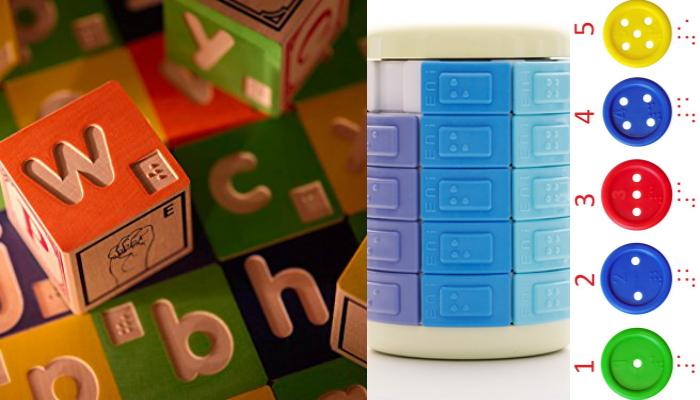
Braille and Literacy, Toys, Visual Impairment
24 Braille Toys for Kids Who are Blind
Everything from alphabet blocks to raised line coloring pages and activity books to puzzles to card and board games... and so much more! And it's all in braille ready for...
